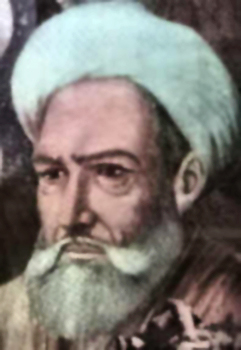 Al Farabi (875-950) was one of the greatest philosophers and scientist of the Islamic world. He was also an acclaimed logician, sociologist, cosmologist, psychologist and musician. Though born in Turkistan he eventually studied philosophy and the Greek sciences in Baghdad. How he gained a livelihood is not clear. Since he lived an ascetic life, his requirements were doubtless few.
Al Farabi (875-950) was one of the greatest philosophers and scientist of the Islamic world. He was also an acclaimed logician, sociologist, cosmologist, psychologist and musician. Though born in Turkistan he eventually studied philosophy and the Greek sciences in Baghdad. How he gained a livelihood is not clear. Since he lived an ascetic life, his requirements were doubtless few.
Philosophy of Al Farabi
Al Farabi was also known as "the second Teacher" (Aristotle being the first). His philosophy may be described as having a foundation of Aristotelianism, and a superstructure of Neoplatonic metaphysics. To this he added a political theory based on the study of Plato`s Republic and Laws. The last element seems to be an original contribution of his own, but in the former two he is developing the line of thought of Al Kindi. In the centre of his metaphysics is the First Being or absolute One, which was understood to be identical with God as proclaimed in Islamic doctrine. From him emanated all other existent things in hierarchical order. Similarly in the state there is a head from whom all authority in the state emanates in that he assigns men to their appropriate grades (in something the same way as the Abbasid Caliph assigned men to various posts in the court and the administration). The grades are described as grades of commanding and obeying or of controlling and being controlled. At the top is the who controls others but is not himself controlled. At the foot in the lowest grade are those who are themselves controlled but do not control any others below them. The intermediate grades control others and are themselves controlled in varying degrees.
Al Farabi uses perfectly general terms (like head rather than Imam or Caliph) which could be applied to non-Islamic states as well as to the Islamic empire, but he is thinking primarily of the Islamic world. The first head of his ideal state is a Prophet who has also the best qualities of the true philosopher. He is to be followed by a second head who should have slightly different qualities. What is said about the second head could be interpreted in such a way as to make him more or less identical with an Imamite Imam, and that would mean that al Farabi`s philosophy could be regarded as providing a basis for Imamite Shiaism. This would make him acceptable in Shiaite Aleppo. Whether this is his own dominant view, however, is not clear, for he goes on to say that, if the qualities necessary for the second head are not all found in one man, then rule may be divided among those who share the qualities; and among those who thus share authority are some whose descriptions correspond to the Traditionists and Ulema (as they were in Baghdad in the early tenth century). Perhaps al Farabi really tried to keep aloof from the conflict between Shiaism and Sunnism and the underlying struggle of rival interests, and was chiefly concerned that philosophy should be fully used to improve conditions in the Caliphate.




















